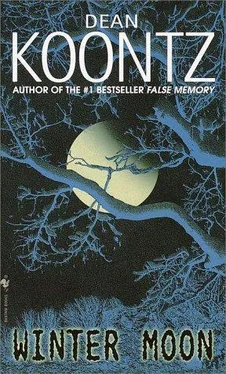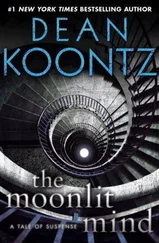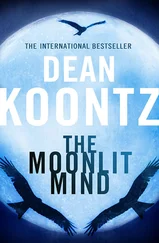Dean Koontz - Winter Moon
Здесь есть возможность читать онлайн «Dean Koontz - Winter Moon» весь текст электронной книги совершенно бесплатно (целиком полную версию без сокращений). В некоторых случаях можно слушать аудио, скачать через торрент в формате fb2 и присутствует краткое содержание. Год выпуска: 2001, ISBN: 2001, Издательство: 2001-01-01, Жанр: Триллер, на английском языке. Описание произведения, (предисловие) а так же отзывы посетителей доступны на портале библиотеки ЛибКат.
- Название:Winter Moon
- Автор:
- Издательство:2001-01-01
- Жанр:
- Год:2001
- ISBN:9780553582932
- Рейтинг книги:3 / 5. Голосов: 1
-
Избранное:Добавить в избранное
- Отзывы:
-
Ваша оценка:
- 60
- 1
- 2
- 3
- 4
- 5
Winter Moon: краткое содержание, описание и аннотация
Предлагаем к чтению аннотацию, описание, краткое содержание или предисловие (зависит от того, что написал сам автор книги «Winter Moon»). Если вы не нашли необходимую информацию о книге — напишите в комментариях, мы постараемся отыскать её.
Connecting both incidents is policeman Jack McGarvey, who is drawn into a terrifying confrontation with something unearthly.
Winter Moon — читать онлайн бесплатно полную книгу (весь текст) целиком
Ниже представлен текст книги, разбитый по страницам. Система сохранения места последней прочитанной страницы, позволяет с удобством читать онлайн бесплатно книгу «Winter Moon», без необходимости каждый раз заново искать на чём Вы остановились. Поставьте закладку, и сможете в любой момент перейти на страницу, на которой закончили чтение.
Интервал:
Закладка:
He got very drunk that night. The sleep he finally found was as good an approximation of death as any he had known.
If the bird came to his bedroom window while he slept, or walked the edges of the roof above him, he did not hear it.
He didn't wake until ten minutes past noon on July first. For the rest of that day, coping with his hangover and trying to cure it preoccupied him and kept his mind off the morbid verses of a long-dead poet.
The crow was with him July first, second, and third, from morning through night, without surcease, but he tried to ignore it. No more staring matches as with the other sentries. No more one-sided conversations. Eduardo did not sit on the porches. When he was inside, he did not look toward the windows. His narrow life became more constricted than ever.
At three o'clock on the afternoon of the fourth, suffering a bout of claustrophobia from being too long within four walls, he planned a cautious itinerary and, taking the shotgun, went for a walk. He did not look at the sky above him, only toward distant horizons. Twice, however, he saw a swift shadow flash over the ground ahead of him, and he knew that he did not walk alone.
He was returning to the house, only twenty yards from the front porch, when the crow plummeted out of the sky. Its wings flapped uselessly, as if it had forgotten how to fly, and it met the earth with only slightly more grace than a stone dropped from a similar height. It flopped and shrieked on the grass but was dead by the time he reached it.
Without looking closely at the crow, he picked it up by the tip of one wing.
He carried it into the meadow, to throw it where he had tossed the four squirrels on the twenty-fourth of June.
He expected to find a macabre pile of remains, well plucked and dismembered by carrion eaters, but the squirrels were gone. He would not have been surprised if one or even two of the carcasses had been dragged off to be devoured elsewhere. But most carrion eaters would strip the squirrels where they were found, leaving at least several bones, the inedible feet, scraps of fur-covered hide, a well-gnawed and pecked-at skull.
The lack of any remains whatsoever could only mean the squirrels had been removed by the traveler. Or by its sorcerously controlled surrogates.
Perhaps, having tested them to destruction, the traveler wanted to examine them to determine why they failed-which it had not been able to do with the raccoons because Eduardo had intervened and taken them to the veterinarian. Or it might feel that they were, like the.raccoons, evidence of its presence. It might prefer to leave as few loose ends as possible until its position on this world was more firmly established.
He stood in the meadow, staring at the place where the dead squirrels had been. Thinking.
He raised his left hand, from which dangled the broken crow, and stared at the now sightless eyes. As shiny as polished ebony and bulging from the sockets.
"Come on," he whispered.
Finally he took the crow into the house. He had a use for it. A plan.
The wire-mesh colander was held together by sturdy stainless-steel rings at top and bottom, and stood on three short steel legs. It was the size of a two- or three-quart bowl. He used it to drain pasta when he cooked large quantities to make salads or to ensure that there would be plenty of leftovers. Two steel-loop handles were fixed to the top ring, by which to shake it when it was filled with steaming pasta that needed encouragement to fully drain.
Turning the colander over and over in his hands, Eduardo thought through his plan one more time-then began to put it into action.
Standing at a kitchen counter, he folded the wings of the dead crow.
He tucked the whole bird into the colander. With needle and thread, he fixed the crow to the wire mesh in three places. That would prevent the limp body from slipping out when he tilted the colander. As he put the needle and thread aside, the bird rolled its head loosely and shuddered. Eduardo recoiled from it and took a step back from the counter in surprise. The crow issued a feeble, quavery cry. He knew it had been dead. Stone dead. For one thing, its neck had been broken. Its swollen eyes had been virtually hanging out of the sockets. Apparently it had died in mid-flight of a massive brain seizure like those that had killed the raccoons and the squirrels.
Dropping from a great height, it had hit the ground with sickening force, sustaining yet more physical damage. Stone dead.
Now, stitched to the wire mesh of the colander, the reanimated bird was unable to lift its head off its breast, not because it was hampered by the threads with which he'd secured it but because its neck was still broken. Smashed legs flopped uselessly. Crippled wings tried to flutter and were hampered more by the damage to them than by the entangling threads. Overcoming his fear and revulsion, Eduardo pressed one hand against the crow's breast. He couldn't feel a heartbeat.
The heart of any small bird pounded extremely fast, much faster than the heart of any mammal, a racing little engine, putta-putta-putta-putta-putta. It was always easy to detect because the whole body reverberated with the rapid beats.
The crow's heart was definitely not beating. As far as he was able to.tell, the bird wasn't breathing, either. And its neck was broken. He had hoped that he was witnessing the traveler's ability to bring a dead creature back to life, a miracle of sorts. But the truth was darker than that. The crow was dead. Yet it moved.
Trembling with disgust, Eduardo lifted his hand from the small squirming corpse.
The traveler could reestablish control of a carcass without resuscitating the animal. To some extent, it had power over the inanimate as well as the animate.
Eduardo desperately wanted to avoid thinking about that. But he couldn't turn his mind off. Couldn't avoid that dreaded line of inquiry any longer. If he had not taken the raccoons away at once to the vet, would they eventually have shuddered and pulled themselves to their feet again, cold but moving, dead but animated?
In the colander, the crow's head wobbled loosely on its broken neck, and its beak opened and closed with a faint clicking. Perhaps nothing had carried the four dead squirrels out of the meadow, after all.
Maybe those carcasses, stiff with rigor mortis, had responded to the insistent call of the puppetmaster on their own, cold muscles flexing and contracting awkwardly, rigid joints cracking and snapping as demands were put upon them. Even as their bodies had entered the early stages of decomposition, perhaps they twitched and lifted their heads, crawled and hitched and dragged themselves out of the meadow, into the woods, to the lair of the thing that commanded them.
Don't think about it. Stop. Think about something else, for Christ's sake.
Anything else. Not this, not this.
If he released the crow from the colander and took it outside, would it flop and flutter along the ground on its broken wings, all the way up the sloped backyard, making a nightmarish pilgrimage into the shadows of the higher woods?
Did he dare follow it into that heart of darkness? No. No, if there was to be an ultimate confrontation, it had to happen here on his own territory, not in whatever strange nest the traveler had made for itself.
Eduardo was stricken by the blood-freezing suspicion that the traveler was alien to such an extreme degree that it didn't share humanity's perception of life and death, didn't draw the line between the two in the same place at all. Perhaps its kind never died. Or they died in a true biological sense yet were reborn in a different form out of their own rotting remains-and expected the same to be true of creatures on this world. In fact, the nature of their species-especially its relationship with death-might be unimaginably more bizarre, perverse, and repellent than anything his imagination could conceive.
Читать дальшеИнтервал:
Закладка:
Похожие книги на «Winter Moon»
Представляем Вашему вниманию похожие книги на «Winter Moon» списком для выбора. Мы отобрали схожую по названию и смыслу литературу в надежде предоставить читателям больше вариантов отыскать новые, интересные, ещё непрочитанные произведения.
Обсуждение, отзывы о книге «Winter Moon» и просто собственные мнения читателей. Оставьте ваши комментарии, напишите, что Вы думаете о произведении, его смысле или главных героях. Укажите что конкретно понравилось, а что нет, и почему Вы так считаете.












